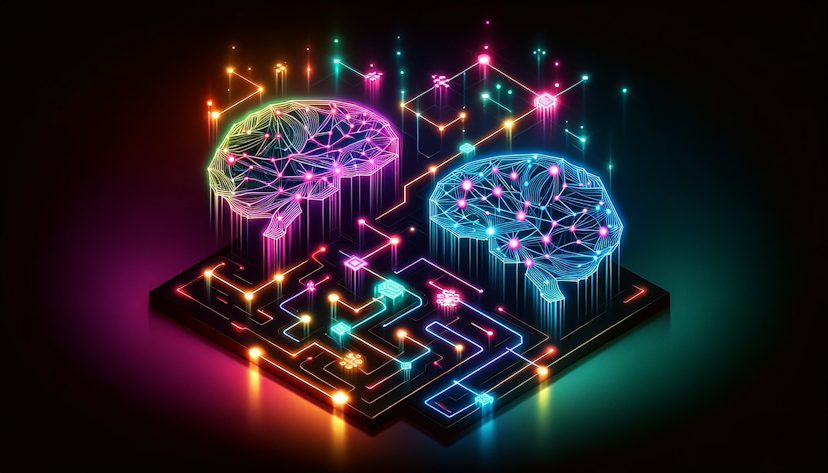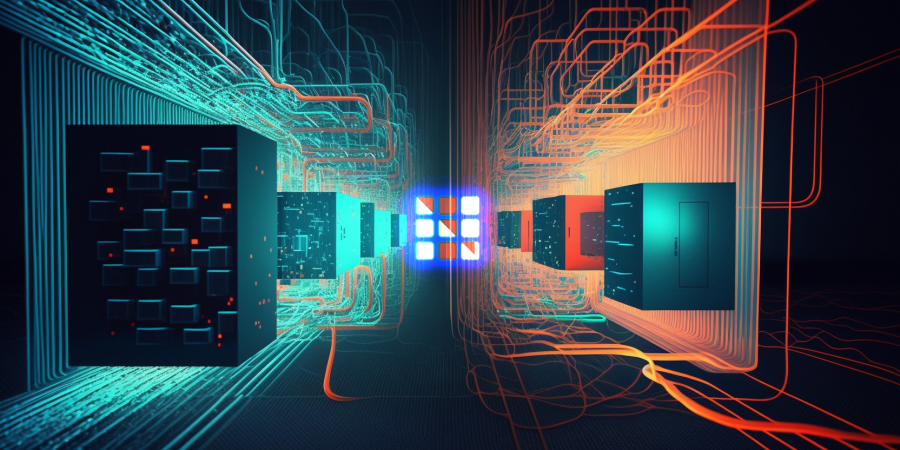The Intersection of AI and Blockchain: A Paradigm Shift in Technology
Introduction: Understanding the Convergence of AI and Blockchain
The convergence of Artificial Intelligence (AI) and Blockchain technologies marks a significant turning point in the landscape of modern technology. Over the past decade, both AI and Blockchain have individually reshaped industries and challenged traditional paradigms. However, it is their intersection that promises to usher in a new era of innovation and disruption. In this introductory section, we delve into the fundamental principles of AI and Blockchain, exploring how their convergence is driving a paradigm shift in technology. By understanding the synergies between these two domains, we can better grasp the transformative potential they hold and the implications for various sectors, from finance to healthcare and beyond.
Evolution of Artificial Intelligence: From Machine Learning to Deep Learning
The evolution of Artificial Intelligence (AI) from its early inception to its current state has been marked by significant advancements, particularly in the realms of machine learning and deep learning.
At its nascent stage, AI primarily relied on rule-based systems and expert systems, where predefined rules were programmed to mimic human decision-making processes. While these systems demonstrated some level of intelligence, they were limited in their ability to adapt and learn from new data.
The advent of machine learning revolutionized the field of AI by introducing algorithms that could learn from data and improve their performance over time without being explicitly programmed. Supervised learning algorithms, such as linear regression and decision trees, enabled machines to make predictions or classifications based on labeled training data. Unsupervised learning algorithms, on the other hand, allowed machines to discover hidden patterns or structures within unlabeled data. Reinforcement learning further expanded the capabilities of AI by enabling agents to learn optimal behaviors through trial and error, guided by rewards or penalties. However, it was the emergence of deep learning that truly propelled AI to new heights. Deep learning is a subset of machine learning that employs artificial neural networks with multiple layers (hence the term "deep") to extract intricate patterns from vast amounts of data. Inspired by the structure and function of the human brain, deep learning algorithms excel at tasks such as image recognition, natural language processing, and speech recognition. Through techniques like convolutional neural networks (CNNs) and recurrent neural networks (RNNs), deep learning has achieved unprecedented levels of accuracy and performance in various domains.
However, it was the emergence of deep learning that truly propelled AI to new heights. Deep learning is a subset of machine learning that employs artificial neural networks with multiple layers (hence the term "deep") to extract intricate patterns from vast amounts of data. Inspired by the structure and function of the human brain, deep learning algorithms excel at tasks such as image recognition, natural language processing, and speech recognition. Through techniques like convolutional neural networks (CNNs) and recurrent neural networks (RNNs), deep learning has achieved unprecedented levels of accuracy and performance in various domains.
Unraveling Blockchain Technology: Principles and Applications
Unraveling the intricate nature of Blockchain technology unveils a paradigm-shifting approach to data management and security. At its core, Blockchain is a decentralized and distributed ledger technology that records transactions across a network of computers in a transparent and immutable manner.
The foundational principle of Blockchain lies in its decentralized nature, where no single entity has control over the entire network. Instead, transactions are verified and recorded by a consensus mechanism, typically through a process known as mining in public Blockchain networks like Bitcoin or through validation by trusted nodes in permissioned Blockchains. This decentralized architecture ensures the integrity and immutability of data stored on the Blockchain, as tampering with any single record would require altering the entire chain, which is practically infeasible due to cryptographic hash functions.
Enhancing Security with AI-Driven Blockchain Solutions
Enhancing security through the integration of AI-driven solutions within Blockchain technology represents a formidable approach to fortifying digital infrastructure and mitigating emerging threats in the modern age.
At its core, Blockchain technology offers inherent security features such as decentralization, immutability, and cryptographic hashing. However, the dynamic and evolving nature of cyber threats necessitates continuous innovation to bolster security measures further. This is where Artificial Intelligence (AI) steps in, leveraging its capabilities to augment the resilience of Blockchain networks.
Smart Contracts and AI: Automating Transactions for Efficiency and Trust
Smart contracts, coupled with Artificial Intelligence (AI), constitute a formidable synergy that not only automates transactions but also enhances efficiency and trust within decentralized systems.
At its core, smart contracts are self-executing contracts with predefined terms written directly into code. These contracts reside on a Blockchain network, enabling automated and tamper-proof execution of transactions once predefined conditions are met. While traditional smart contracts operate based on predetermined rules, integrating AI into smart contract functionality introduces a new layer of intelligence and adaptability. AI augments smart contracts by enabling them to dynamically adapt to changing circumstances and optimize transactional processes. Machine learning algorithms embedded within smart contracts can analyze historical transaction data, identify patterns, and make informed decisions autonomously. This capability empowers smart contracts to respond intelligently to evolving conditions, such as fluctuating market prices or changing customer preferences, without the need for manual intervention.
AI augments smart contracts by enabling them to dynamically adapt to changing circumstances and optimize transactional processes. Machine learning algorithms embedded within smart contracts can analyze historical transaction data, identify patterns, and make informed decisions autonomously. This capability empowers smart contracts to respond intelligently to evolving conditions, such as fluctuating market prices or changing customer preferences, without the need for manual intervention.
Decentralized AI Marketplaces: Empowering Access to Advanced Algorithms
Decentralized AI marketplaces represent a groundbreaking innovation that democratizes access to advanced algorithms and AI-driven solutions, fostering innovation and collaboration on a global scale.
Traditionally, accessing advanced AI algorithms and expertise has been restricted to well-resourced organizations with the technical know-how and financial means to develop or license proprietary solutions. However, decentralized AI marketplaces disrupt this paradigm by providing a decentralized platform where users can buy, sell, and exchange AI algorithms, models, and services securely and transparently, without the need for intermediaries. At the heart of decentralized AI marketplaces is Blockchain technology, which ensures the integrity, transparency, and trustworthiness of transactions. Smart contracts govern the terms of transactions, enabling automated and tamper-proof execution of agreements between buyers and sellers. This decentralized architecture eliminates barriers to entry and facilitates direct peer-to-peer interactions, empowering individuals and organizations of all sizes to access and leverage advanced AI capabilities.
At the heart of decentralized AI marketplaces is Blockchain technology, which ensures the integrity, transparency, and trustworthiness of transactions. Smart contracts govern the terms of transactions, enabling automated and tamper-proof execution of agreements between buyers and sellers. This decentralized architecture eliminates barriers to entry and facilitates direct peer-to-peer interactions, empowering individuals and organizations of all sizes to access and leverage advanced AI capabilities.
Future Directions: Opportunities and Implications of AI-Blockchain Integration
The integration of Artificial Intelligence (AI) and Blockchain technology is poised to shape the future of numerous industries and pave the way for transformative innovations. As this convergence continues to evolve, it presents a plethora of opportunities and implications that will redefine the way we interact with technology and conduct business.
- Enhanced Security and Trust:
- AI-powered security solutions can strengthen Blockchain networks by proactively detecting and mitigating cyber threats, enhancing data integrity and protecting against unauthorized access.
- Blockchain's transparent and immutable ledger provides a secure foundation for AI algorithms, ensuring the integrity and traceability of data used for training and inference.
- Decentralized Autonomous Organizations (DAOs):
- AI-driven smart contracts enable the creation of decentralized autonomous organizations (DAOs), where decision-making processes are automated and governed by predefined rules and consensus mechanisms.
- DAOs empower communities to govern themselves autonomously, facilitating transparent and efficient collaboration without the need for intermediaries.
- Personalized and Context-Aware Services:
- The integration of AI and Blockchain enables the creation of personalized and context-aware services tailored to individual user preferences and behaviors.
- AI algorithms analyze Blockchain data to deliver personalized recommendations, optimize user experiences, and anticipate user needs in real-time.
- Democratized Access to AI:
- Decentralized AI marketplaces democratize access to advanced AI algorithms and expertise, enabling individuals and organizations of all sizes to leverage AI-driven solutions for innovation and value creation.
- Blockchain-based platforms facilitate transparent and secure transactions, fostering collaboration and knowledge-sharing within the AI community.
- Data Privacy and Sovereignty:
- Blockchain technology enables individuals to retain control over their personal data through self-sovereign identity solutions, where users have ownership of their digital identities and control access to their data.
- AI algorithms can analyze encrypted data stored on the Blockchain without compromising data privacy, enabling secure and privacy-preserving analytics.
- Sustainable and Ethical AI:
- Blockchain-based solutions provide transparent and auditable records of AI algorithms and decision-making processes, enhancing accountability and promoting ethical AI practices.
- AI-driven optimization algorithms can contribute to sustainable development by optimizing resource allocation, reducing energy consumption, and mitigating environmental impacts.
 Overall, the integration of AI and Blockchain technology represents a paradigm shift in the way we conceptualize and deploy technological solutions. By leveraging the synergies between AI's cognitive capabilities and Blockchain's security and transparency, organizations can unlock new opportunities for innovation, collaboration, and value creation, while addressing pressing challenges related to security, privacy, and trust in an increasingly digitalized world.
Overall, the integration of AI and Blockchain technology represents a paradigm shift in the way we conceptualize and deploy technological solutions. By leveraging the synergies between AI's cognitive capabilities and Blockchain's security and transparency, organizations can unlock new opportunities for innovation, collaboration, and value creation, while addressing pressing challenges related to security, privacy, and trust in an increasingly digitalized world.
My Other Articles
Dogecoin: The Meme That Became a Cryptocurrency Sensation
Robinhood Stock Market: Revolutionizing Trading for the Masses
Understanding the Cosmos Ecosystem
Unraveling the Layers: Exploring the Significance of Layer 2 in Networking Technologies
Exploring the World of GameFi and its Impact on the Future of Gaming





























